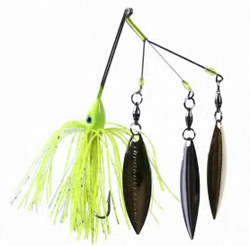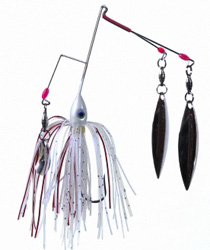 Few,
if any, new innovative fishing lures are ever made. The
majority of "new" lures are just resized or regurgitated
lures already being produced. They are made to catch anglers
and not fish. For BustinBass lures, it was going against the
traditional way of thinking that sets them apart from the other spinnerbait
manufactures. In a revolutionary move, BustinBass has turned
their back on the old, traditional two-dimensional spinnerbait to produce
a new three-dimensional spinnerbait with "multi-wire spinnerbait
technology". Without a doubt, it's not your daddy's
spinnerbait.
Few,
if any, new innovative fishing lures are ever made. The
majority of "new" lures are just resized or regurgitated
lures already being produced. They are made to catch anglers
and not fish. For BustinBass lures, it was going against the
traditional way of thinking that sets them apart from the other spinnerbait
manufactures. In a revolutionary move, BustinBass has turned
their back on the old, traditional two-dimensional spinnerbait to produce
a new three-dimensional spinnerbait with "multi-wire spinnerbait
technology". Without a doubt, it's not your daddy's
spinnerbait.
The history of
lures goes way back to 1852 when the first patent was granted to
Julio T. Buel. Apparently, Buel accidently dropped
a tablespoon while fishing on a lake in Vermont and as it fluttered
down, a lake trout ate it. After that incident, Buel began manufacturing
the Buel Trolling Spoons; later, Buel began producing in-line spinners. In
1917, W.J. Jamison Company began producing the Shannon Twin Spin. These
lures were built with two overhead Indiana spinner blades on a wire
shaft. Later, in 1925, Jamison began producing a single overhead
spinnerbait that resembles today's modern day spinnerbait. The
skirts on these lures consisted of bucktail or feathers and tied on
with thread by hand. Back then, anglers were limited to white,
black, or red and white for skirt colors. Later, the demand
for spinnerbaits increased with the development of rubber skirts and
vinyl skirts seventy-five years later. The beginning of bass
tournaments brought another influx of anglers using spinnerbaits and
every lure manufacture began producing them.
 Today, the majority of manufactures producing lures keep to
the traditional style when building their spinnerbaits. Kevin
Phelps, founder and president of BustinBass believes it is time for
a change. "At BustinBass, we have developed a patent pending
new way of building a spinnerbait," Phelps continued, "BustinBass
uses "multi-wire spinnerbait technology" to build every
spinnerbait we produce." This technology allows BustinBass
to create new, innovative spinnerbaits with different blade and arm
combinations. "Right now, we have eleven different models,
but new models and lures are being researched for future manufacturing," revealed
Phelps. All of BustinBass lures are built with an exclusive double
or triple wire arm running from the blades to the head. The one-of-a-kind
three-dimensional spinnerbaits were built to mimic a school of baitfish
or individual forage. "BustinBass spinnerbaits have a
unique flash and displaces large amounts of water, attracting fish
from long distances and isolated cover," explained Phelps.Phelps
did recommend that anglers use a 3/0 Eagle Claw trailer hook on all
of the BustinBass spinnerbaits, especially if fish short strike the
lure.
Today, the majority of manufactures producing lures keep to
the traditional style when building their spinnerbaits. Kevin
Phelps, founder and president of BustinBass believes it is time for
a change. "At BustinBass, we have developed a patent pending
new way of building a spinnerbait," Phelps continued, "BustinBass
uses "multi-wire spinnerbait technology" to build every
spinnerbait we produce." This technology allows BustinBass
to create new, innovative spinnerbaits with different blade and arm
combinations. "Right now, we have eleven different models,
but new models and lures are being researched for future manufacturing," revealed
Phelps. All of BustinBass lures are built with an exclusive double
or triple wire arm running from the blades to the head. The one-of-a-kind
three-dimensional spinnerbaits were built to mimic a school of baitfish
or individual forage. "BustinBass spinnerbaits have a
unique flash and displaces large amounts of water, attracting fish
from long distances and isolated cover," explained Phelps.Phelps
did recommend that anglers use a 3/0 Eagle Claw trailer hook on all
of the BustinBass spinnerbaits, especially if fish short strike the
lure.
Every BustinBass
spinnerbait is made in the U.S.A. and come with premium Worth spinnerbait
blades, Eagle Claw Lazer Sharp Hooks, and other high-quality components. Anglers can select from a number of different skirt
colors including chartreuse, pearl white, white, black and blue, and
black. BustinBass spinnerbait skirts come standard with 52-stands. The
Worth spinnerbait blades come in nickel plated or gold either in willow
leaf or Colorado shaped. Models of available BustinBass include
Triple Threat, Weed Demon, Ambush, Max TAC, Lunker, Hawg, Crank, Ripple,
Rut Buster, Rocket, and Keeper. Depending on the model, anglers
can find the exact blade combination for every fishing situation. Anglers
checking out BustinBass (www.bustinbass.com or
phone (877) 687-5873) website will find that they are using new 360-degree
view videos of every model spinnerbait BustinBass offers. So
anglers get a three-dimensional view of a three-dimensional lure.
The
innovative "multi-wire spinnerbait technology" brings a new wave
of never seen before spinnerbaits and for many well-educated fish
this spells trouble. BustinBass spinnerbaits are definitely not your
daddy's spinnerbait; however, if your daddy asks for one, you really
should share.
 Brad
Wiegmann is a full time fishing guide on Beaver lake and
Lake SWEPCO in Northwest Arkansas. Brad guides for Largemouth,
Spotted, Smallmouth, Stripers and White Bass. He is also a free-lance
writer who's weekly column "Speaking of Fishing" appears
weekly in several local newspapers. You may also see him doing
seminars, working outdoor shows or featured in outdoor magazines such
as BASSMASTER Magazine, Outdoor life and Arkansas Sportsman. He
also fishes the FLW Tour, Stren and local open tournaments. He
is currently on the Pro staff, promotional staff and guide programs
of numerous tackle manufactures, lure companies, and fishing related
companies. You can contact him at (479) 756-5279, at bwiegmann@cox.net or
visit his website at www.bradwiegmann.com for
more information.
Brad
Wiegmann is a full time fishing guide on Beaver lake and
Lake SWEPCO in Northwest Arkansas. Brad guides for Largemouth,
Spotted, Smallmouth, Stripers and White Bass. He is also a free-lance
writer who's weekly column "Speaking of Fishing" appears
weekly in several local newspapers. You may also see him doing
seminars, working outdoor shows or featured in outdoor magazines such
as BASSMASTER Magazine, Outdoor life and Arkansas Sportsman. He
also fishes the FLW Tour, Stren and local open tournaments. He
is currently on the Pro staff, promotional staff and guide programs
of numerous tackle manufactures, lure companies, and fishing related
companies. You can contact him at (479) 756-5279, at bwiegmann@cox.net or
visit his website at www.bradwiegmann.com for
more information.

